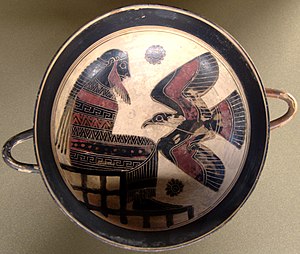Spartan Constitution
| Sparta |
 Zeus on his throne with his eagle This article is part of the series: |
|
Great Rhetra Laws of Lycurgus Politeia |
|---|
|
List of Kings of Sparta Gerousia Ephorate Apella of the Damos Spartiates Perioeci Helots Agoge Syssitia |
|
Spartan army • Other Greek city-states • |
This article is part of the series:
Spartan Constitution
The Spartan Constitution, or Politeia, refers to the government and laws of the Dorian city-state of Sparta from the time of Lycurgus, the legendary law-giver, to the incorporation of Sparta into the Roman Empire: approximately the 9th century BC to the 2nd century BC. Every city-state of Greece had a politeia at all times of its sovereign life, including the preceding Achaean Sparta and the subsequent Roman Sparta. The politeia of Dorian Sparta, however, was noted by many classical authors for its unique features, which supported a rigidly layered social system and a strong military.
According to Plutarch,Lycurgus (to whom is attributed the establishment of the severe reforms for which Sparta has become renowned, sometime in the 9th century BC) first sought counsel from the god Apollo by obtaining an oracle from Delphi regarding the formation of his government. The divine proclamation, which he received in this manner, is known as a "rhetra" and is given in part by Plutarch as follows:
Plutarch provides by way of explanation: "In these clauses, the "phylai" and the "obai" refer to divisions and distributions of the people into clans and phratries, or brotherhoods; by "archagetai" the kings are designated, and "appellazein" means to assemble the people, with a reference to Apollo, the Pythian god, who was the source and author of the polity. The Babyca is now called Cheimarrus, and the Cnacion Oenus; but Aristotle says that Cnacion is a river, and Babyca a bridge."
Another version of the rhetra is given by H. Michell:
That is to say that after the people had been divided according to their different tribes ("phyles" and "obes"), they would welcome the new Lycurgan reforms.
The Spartans had no historical records, literature, or written laws, which were, according to tradition, expressly prohibited by an ordinance of Lycurgus, excluding the Great Rhetra.
...
Wikipedia
